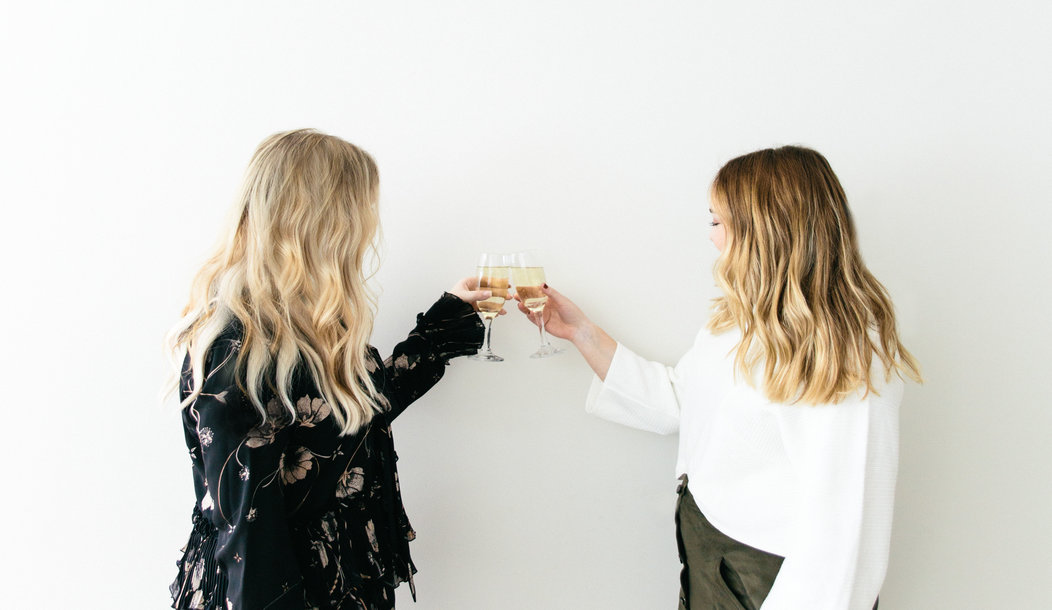
With a fashion startup, you can demonstrate social proof of your brand in a number of different ways. If you’re not familiar with the term, social proof is a psychological phenomenon that happens when people are unfamiliar with how to behave (or unfamiliar with your brand). They base their actions off of what other people are doing around them, assuming that’s the correct behavior. Simply put, if everyone else loves your stuff, maybe I should try it too.
Especially as a less established brand, you’ll want to leverage things like expertise and testimonials to validate your brand and your products. Let’s walk through a few different types of social proof and how you can use them to your advantage in fashion marketing:
Customer Reviews and Testimonials
By showcasing positive and helpful customer reviews, you’ll give your potential customers the extra nudge they need. You can display reviews on your product pages (there are Shopify plugins for this if you’re using that service!) to answer any questions your visitors have about specific products.
In addition, you can feature great user reviews via email, social media, and even during the checkout process. Put customer testimonial quotes on your Instagram. Reshare customer posts that rave about your clothing. Show off unboxing videos from your customers. This is a great way to incorporate more user-generated content that feels authentic while also making your customers feel special.
One other thing to keep in mind when it comes to reviews: positive reviews are great, of course, but you’ll really find value in the reviews that provide specific feedback. This is particularly true when it comes to sizing for fashion. Zappos does a great job with this by allowing reviewers to score shoe sizing, based on factors like being true-to-size, shoe width, and comfort level.
You can also leverage your customers to feature your “best-selling products” or “top-rated products” in your marketing or on your website. This helps to drive sales to specific items. Develop categories or themes based on what your customers like the best, and use that as social proof for those products!
Influencers and Experts
This category of social proof is an extension of user reviews, simply heightened based on the level of expertise or clout of the person reviewing. These experts might be fashion models, designers, or celebrities. Influencers can also range from fashion bloggers to Instagrammers, to the next new social media craze, whatever it might be. There’s a ton of opportunity here for you to find what works for you.
While it will definitely benefit you to have those expert quotes and photos on your site when someone is shopping, these types of endorsements are also particularly helpful for growing brand awareness. This can be activated when the influencer or expert endorses your brand to their own communities. It’s super important to make sure that is part of the agreement with the influencers you work with.
You can focus on one or two big-name endorsements, where you might be able to get that celebrity in your marketing materials. Or you can take your chances with micro-influencers. These are influencer marketing campaigns that target a higher volume of smaller influencers, often with niche audiences. Or anything in between! It really just depends on what works best for your brand.
Peer Social Proof
Peer social proof is often used in tandem with connected social networks. This offers a way for people to see what their group of friends thinks about a brand or a product. This can be as simple as showing that your customer’s friends have shopped there before, they have liked one of the products, or that they also follow the brand on Facebook or Instagram.
For example, let’s say you’re looking at a product on an online store. If you’ve connected your Facebook account to this store, you might see that a friend of yours has recently purchased or liked this product. That’s probably going to make you more likely to trust it and want to purchase, right? Or if you come across a new brand you’ve never heard of, seeing that five of your friends like the brand’s Instagram is probably a good indication that you will like it too.
Facebook and Instagram also have built-in ways to point out this social proof. For example, Facebook will often show you pages or posts by brands that your friends have liked. By getting your brand’s followers to engage with your posts, you are making it more likely that their friends will see your page as well.
Similarly, Instagram also has that “Following” tab which shows the accounts that your friends are liking and commenting on. Think about how you can get the word out using these tools.
Peer social proof also shows up in one of the best marketing channels: a referral program. By getting your happy customers to talk about you to their friends, you’re letting them do the marketing for you.
Crowd Social Proof
Speaking of Facebook and Instagram, these are helpful communities to build for many reasons, and one of them is the social proof of a crowd. Simply put, if 100,000 people like your brand on Instagram, it’s got to be a pretty great brand worth looking into.
Obviously, there are so many more uses for social networks like Facebook and Instagram, but this crowd social proof shouldn’t be brushed aside. You’d be suspicious of a large brand that had zero social media presence. Follower count goes a long way when it comes to validation that you’re a legitimate fashion brand making high-quality goods that people want. This truly helps amplify your voice. In fact, many brands have been built on social media by focusing on growing those communities.
We recommend incorporating a few different types of social proof into your marketing efforts. See what works best for your fashion brand and adjust as needed!

